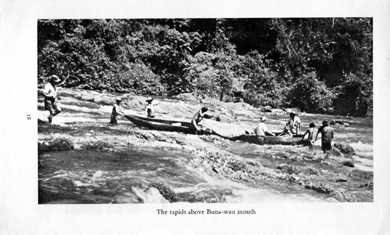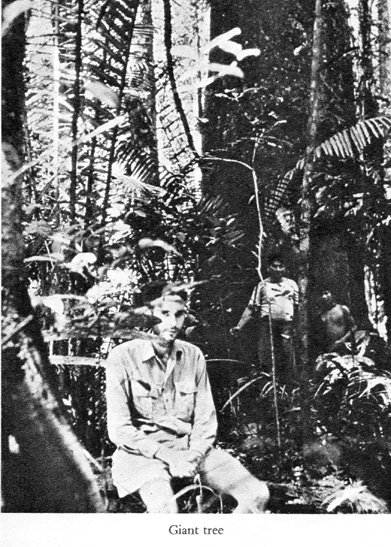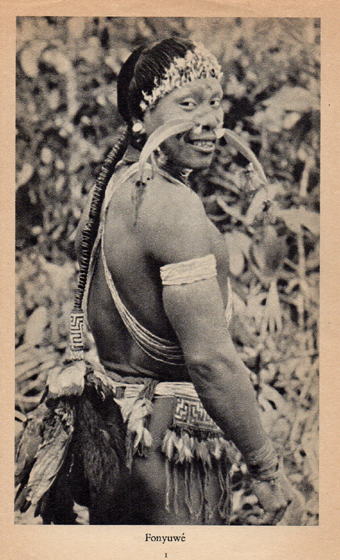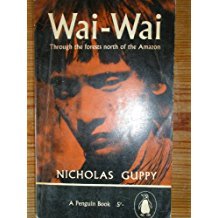AMAZON EXPLORER – Nicholas Guppy and the Wai-Wai tribe.
Nicholas GUPPY wrote about the remote Amazonian tribe he found whilst exploring the upper waters of the Rio-Alto-Trombetas in the 1950’s and he wrote about it afterwards in his book: ‘Wai-Wai; Through the Forests North of the Amazon’ published in New York by E. P. Dutton & Co., in 1958.
I first read the book in 1960 and still have this paperback, now bedraggled from its long journey through several homes over the years. Sadly it is losing its binding and is yellowing, but is still very readable. The measly photos (not measly in content) are because I scanned them from my book.
The First edition, of 375 pages, with illustrations from photos, endpaper maps showing author's route,a profile of the Serra Acarai Rain Forest, plus index and glossary, is apparently still in print. I have no idea what became of the Wai Wai tribe, possibly decimated or westernised enough to wipe them out. Simply through disease they had hitherto been untouched by.
The author was the first white man to penetrate the Amazonian forests of Amazonia drained by the upper parts of the Rio Trombetas in British Guiana, near the Brazilian border, where he found the Wai-Wai tribes of Indians whose existence was only legendary up to then.
From reading his book, it appears that Nicholas Guppy was a man of sensitivity as he described the native peoples, and their activities, their customs, beliefs and religion, as well as the botany of the rain forests, based on two expeditions over a four year period. Guppy, the first to write of the people there, describes their art as becoming increasingly abstract and the reasons for it.
Shortly after the Second World War, still in his twenties, he made his mark by leading a number of expeditions into the interior of British Guiana (now Guyana) and afterwards to the northern Amazonian jungles, where he lived for several years among the Wai-Wai people.

Rapid above the Buna-wau mouth
His first encounter with the Wai-Wai, a tribe “untouched by civilisation, marvellous in the beauty of their painted bodies and feather ornaments”, was in September 1952, when Guppy set out for the rainforest with a small group of companions.
Guppy was greeted by “a dozen almost naked vermilion-painted men, carrying immense bows and arrows”; but the Wai-Wai warriors were friendly and smiling. He soon warmed to them, touched by their hospitality and charmed by their strange music, which was played on a type of bamboo flute on scales unfamiliar to some western ears; it was not unlike a Gregorian chant.
Guppy was an only child of Heugenot descent, born in Port of Spain, Trinidad, on December 22, 1925. As a boy, he would apparently paddle by boat across the small strait that separated his family’s island from the mainland to attend school. It was an idyllic childhood abruptly ended by the death of his father after prolonged bouts of malaria. His mother’s subsequent decision to sell up and his emigration to England at the age of 12, a year before the outbreak of war, must have been a rude awakening to this childhood.
His schooling included Kelly College, Tavistock, where he went up to Trinity college, Cambridge, to read Natural Sciences, taking a degree in Botany. He studied at the Imperial Forestry Institute in Oxford, and after a year at Magdalen college, travelled to British Guiana with the Colonial Service, leading six expeditions into the interior. For two years he researched as a guest scientist at the New York Botanical Gardens.
In 1962 he married Shusha (née Assar), an Iranian singer and songwriter and a gifted author in her own right. Although the marriage ended after 15 years, the couple continued to live opposite one another in the same Chelsea street for the sake of their two sons, and to enjoy each other’s company. They had two sons, Darius and Constantine. Darius is active in UK public life and seems to court controversy. Constantine is a businessman.
From the fourth chapter of his book he writes as he nears the village where the tribe had first been seen. Guppy explained what he saw: “A dugout canoe tied to a tree indicated the landings, and from it a short path led through the forest to an enormous clearing of about sixty acres, where the forest had been felled and planted with cassava, sugar canes, yams, bananas and much else.
Straight ahead, framed by the trees of the path, and nestling among the silvery green arrows of the sugar cane, stood the village, a single conical house thatched with pale yellow palm straw; about twenty-five feet high, with, above it, borne by the projecting centre-pole, a second miniature cone of thatch to protect the smoke-hole; while below the eaves its low wall curved in gracefully to form sheltered doorways on two opposite sides. It was of singular perfection of form; it had, one felt, architecture and dignity far beyond its pretensions.”

Guppy sits near a very big tree
Guppy and his guides came upon a woman hammering upon a board, a little boy tugging at her breast, a tame toucan hopping and shuffling beside her. The woman who was under a small shelter to the side, disappeared into the house and out came two tribesmen, bearing stools for them to sit on. They shook hands and sat down and the woman brought refreshments.
How Guppy describes his first and subsequent visits make up the rest of the book, absolutely fascinating and even more so reading it today. He obviously had a great respect and admiration for the Wai-Wai and I believe that must have been reciprocated.

Native Fonyuwe
In later life Guppy knew success, he mixed with artists and musicians and had a large collection of artefacts he had gathered during his travels and which he loved to show to people. He married three times and ended his days on Bali with his third wife, and unwell from the remains of a Hook-worm infection he had received years earlier. He died in 2012 aged 86 and his legacy is his books on his explorations and his sensitive dealings with forgotten tribes.
This is a very short piece as there is so much from that book and the consequences, of Guppy’s later life, and too much to write here. According to the WWF (World Wildlife Fund) there is a clear link between the health of the Amazon and the health of the planet. The rain forests, which contain 90-140 billion metric tons of carbon, help stabilize local and global climate. Deforestation may release significant amounts of this carbon, which could have catastrophic consequences around the world. It’s very sad that not everyone realises that this an on-going problem for our planet.
The book that Guppy wrote about the Wai-Wai is not only a testament to how indigenous tribes should be treated, but how their lives show how the modern world could learn a lot from them. The book is still in print and I found an exact copy of my own on Amazon for £4. A better edition is under £30. It should stay in print as people could be educated from it in an interesting and positive way.

Photos from the book, book cover courtesy of Amazon, but exactly like my own copy. I hope it as dog-eared as my copy!
intweresting story, thanks for sharing.